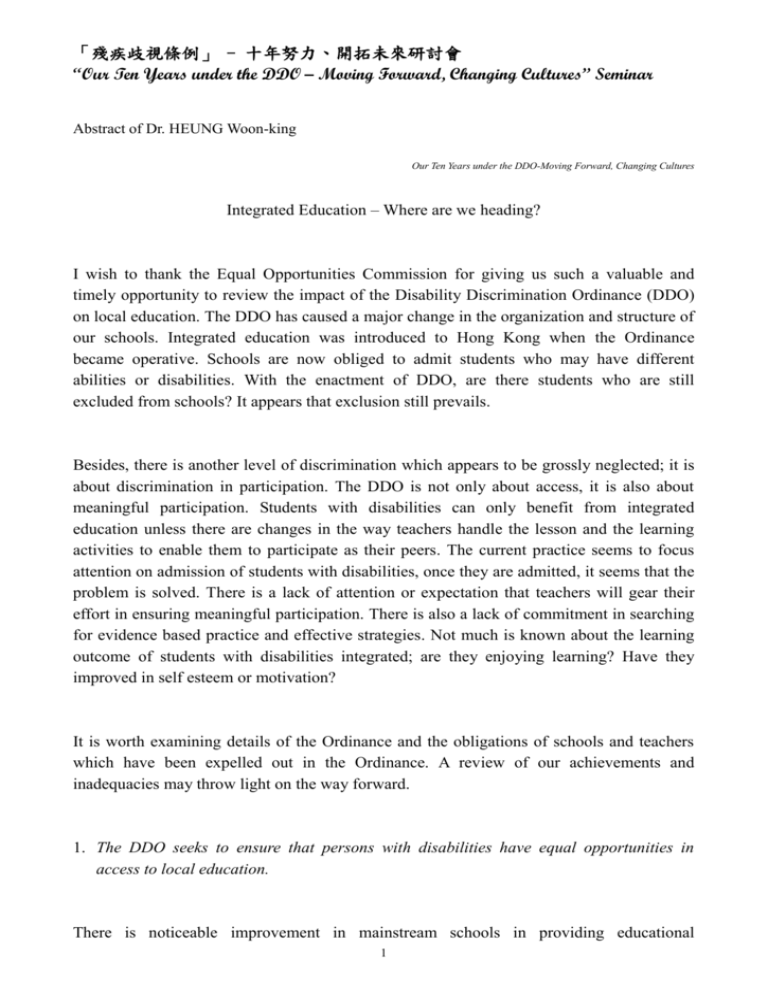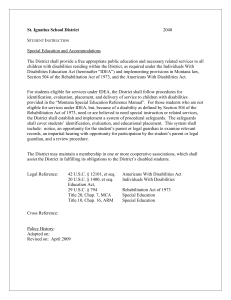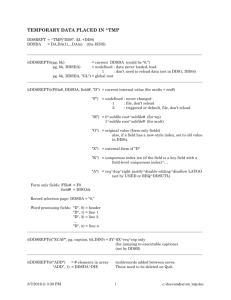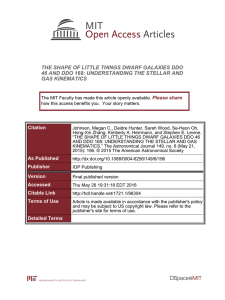Integrated Education – Where are we heading?
advertisement

「殘疾歧視條例」 - 十年努力、開拓未來研討會 “Our Ten Years under the DDO – Moving Forward, Changing Cultures” Seminar Abstract of Dr. HEUNG Woon-king Our Ten Years under the DDO-Moving Forward, Changing Cultures Integrated Education – Where are we heading? I wish to thank the Equal Opportunities Commission for giving us such a valuable and timely opportunity to review the impact of the Disability Discrimination Ordinance (DDO) on local education. The DDO has caused a major change in the organization and structure of our schools. Integrated education was introduced to Hong Kong when the Ordinance became operative. Schools are now obliged to admit students who may have different abilities or disabilities. With the enactment of DDO, are there students who are still excluded from schools? It appears that exclusion still prevails. Besides, there is another level of discrimination which appears to be grossly neglected; it is about discrimination in participation. The DDO is not only about access, it is also about meaningful participation. Students with disabilities can only benefit from integrated education unless there are changes in the way teachers handle the lesson and the learning activities to enable them to participate as their peers. The current practice seems to focus attention on admission of students with disabilities, once they are admitted, it seems that the problem is solved. There is a lack of attention or expectation that teachers will gear their effort in ensuring meaningful participation. There is also a lack of commitment in searching for evidence based practice and effective strategies. Not much is known about the learning outcome of students with disabilities integrated; are they enjoying learning? Have they improved in self esteem or motivation? It is worth examining details of the Ordinance and the obligations of schools and teachers which have been expelled out in the Ordinance. A review of our achievements and inadequacies may throw light on the way forward. 1. The DDO seeks to ensure that persons with disabilities have equal opportunities in access to local education. There is noticeable improvement in mainstream schools in providing educational 1 「殘疾歧視條例」 - 十年努力、開拓未來研討會 “Our Ten Years under the DDO – Moving Forward, Changing Cultures” Seminar Abstract of Dr. HEUNG Woon-king opportunities for students with disabilities with the launch of integrated education. The number of mainstream schools joining integration and the New Funding Model has increased progressively. However, the progress of integration has been slow. According to government statistics, only a small percentage of students with special educational needs have been integrated in the past ten years. Currently, integration in Hong Kong is only confined to eight categories of students with special educational needs, viz students with hearing impairment (HI), visual impairment (VI), physical disabilities (PD), Autistic Spectrum Disorders (ASD) with average intelligence, Attention Deficit and Hyperactivity Disorder (ADHD), speech and language impairment (SLI), Specific Learning Difficulties (SpLD), and mild intellectual disabilities (ID). Often, schools will admit students with mild disabilities. Students with challenging behaviors, such as ADHD, autism are not welcome. In part, this may reflect that the capacity of schools in responding to diversity and challenging behaviors is not high. Though the government is now planning to introduce integration to secondary schools, it appears that there is a lack of an overall direction and a long term goal. There is also a lack of commitment in moving towards inclusive education. The aim of inclusive education is to eliminate social exclusion that is a consequence of attitudes and responses to diversity in race, social class, ethnicity, religion, gender, ability and disability. It acknowledges that education is a basic human right and the foundation for a just society. Hong Kong is behind in moving towards inclusive schooling. 2. The DDO seeks to ensure that persons with disabilities have meaningful participation in local education. Schools’ commitment to promote positive educational outcomes for students with disabilities is not clear. There is a lack of expectation in learning outcome and cognitive and psycho social gains for students with disabilities. 3. Obligations of educational establishments: formulate policy, leadership, effective practice, access to same curriculum. 2 「殘疾歧視條例」 - 十年努力、開拓未來研討會 “Our Ten Years under the DDO – Moving Forward, Changing Cultures” Seminar Abstract of Dr. HEUNG Woon-king The DDO requires that schools provide effective leadership and management to ensure meaningful participation of students in curriculum, assessment and learning. It is not clear whether schools are aware of these obligations. There is great variation in leadership practice among schools. It appears that monitoring and accountability issues have not been addressed. 4. Obligations of teachers, other professionals and support staff: acquire sound knowledge, methods of assessment and discipline, tailor the curriculum, effective strategies It appears that not all teachers are aware of the obligations to equip themselves with sound knowledge and to practice curriculum tailoring and effective pedagogy and assessment for students with disabilities in their daily teaching. It is high time that a review of existing practice in schools be conducted to ensure that there is meaningful participation of students with disabilities in schools. The Government and schools should show a commitment in promoting positive educational outcomes for students with disabilities. Government should help schools to develop effective models of support. Both in-class and out of class support are of equal importance. Government should set a goal and a direction for achieving inclusive education. Dr. Vivian Heung Associate Professor The Hong Kong Institute of Education 3











